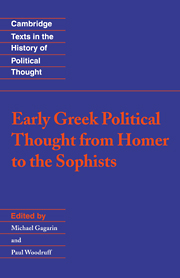Book contents
- Frontmatter
- Contents
- Preface
- Introduction
- Principal dates
- Bibliographical note
- Glossary
- Table of equivalents
- Part I Early poetry
- Homer
- Hesiod
- Archilochus
- Tyrtaeus
- Solon
- Theognis
- Hymn to Hephaestus
- Simonides
- Xenophanes
- Pindar
- Part II Tragedy
- Part III History and folklore
- Part IV Philosophy and science
- Part V Sophists
- Index
- Cambridge Texts in the History of Political Thought
Pindar
Published online by Cambridge University Press: 05 June 2012
- Frontmatter
- Contents
- Preface
- Introduction
- Principal dates
- Bibliographical note
- Glossary
- Table of equivalents
- Part I Early poetry
- Homer
- Hesiod
- Archilochus
- Tyrtaeus
- Solon
- Theognis
- Hymn to Hephaestus
- Simonides
- Xenophanes
- Pindar
- Part II Tragedy
- Part III History and folklore
- Part IV Philosophy and science
- Part V Sophists
- Index
- Cambridge Texts in the History of Political Thought
Summary
Pindar (518–c. 440) was an aristocratic Boeotian lyric poet known especially for his odes in honor of victors at festivals such as the one at Olympia. He wrote for rich and powerful patrons throughout the Greek world and was, on the whole, a defender of tradition. The fragment translated here comes from one of the most frequently cited poems of Greek antiquity. It is most notably cited by Herodotus (3.38, fr. 3) and by Plato, Gorgias 484b (Unknown authors, fr. 2), who quotes the first five lines and summarizes part of the remainder (cf. Laws 680b). About forty lines of the poem have been reconstructed from a recently discovered papyrus and other sources, but the original meaning is increasingly uncertain after line 20. Pindar's point appears to be that, despite the apparent injustice of Heracles' violent treatment of his two victims, the traditional glorification of Heracles' labors makes this behavior just.
The Nomos–Basileus fragment (S 169)
Custom (nomos), king of all,
of mortals and immortals,
takes up and justifies what is most violent
with a supremely high hand. As evidence,
I cite the deeds of Heracles:
for he drove the cattle of Geryon
to the Cyclopean courtyard of Eurystheus
without paying, and when they were not for sale. […]
- Type
- Chapter
- Information
- Early Greek Political Thought from Homer to the Sophists , pp. 40 - 42Publisher: Cambridge University PressPrint publication year: 1995



